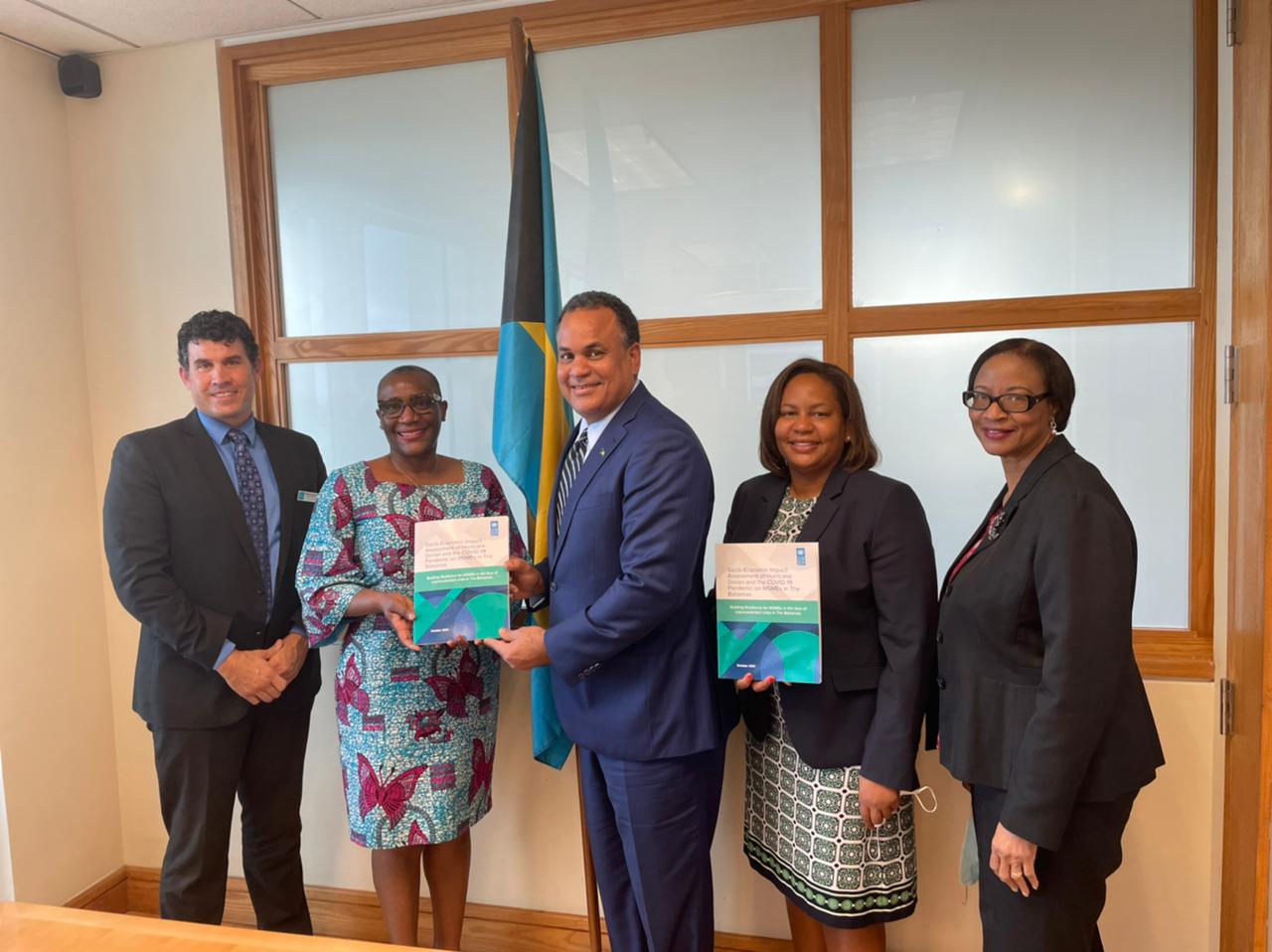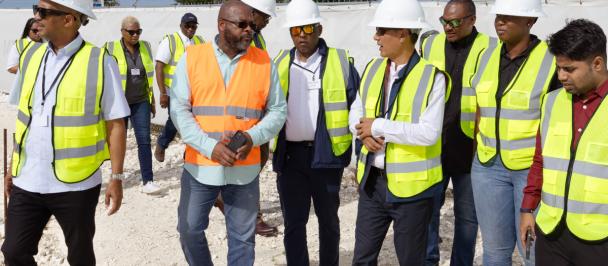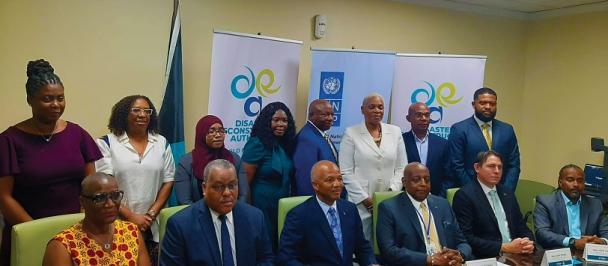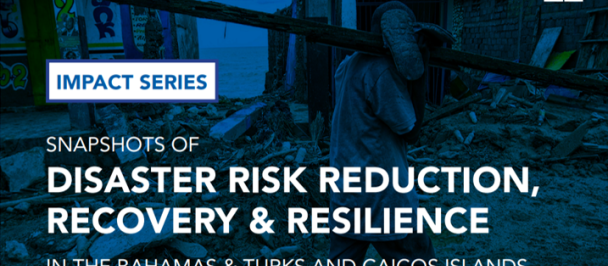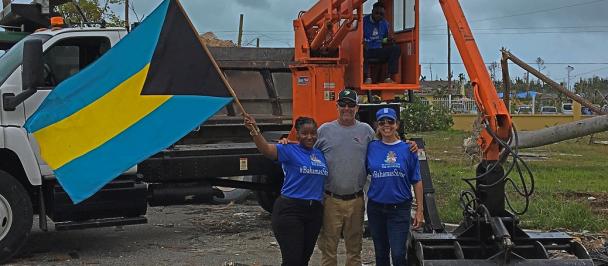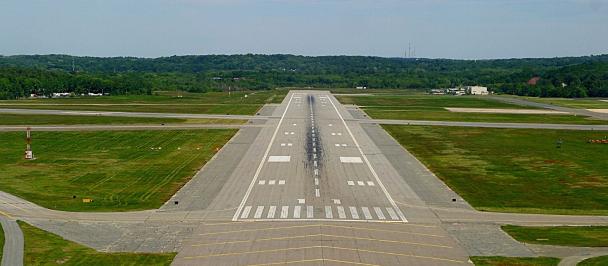Participating in the handing over of the Impact Assessment in The Bahamas on 9 February 2022 are from left: Matthew Aubrey, executive director Organisation for Responsible Governance, Denise E Antonio, UNDP Resident Representative; Senator the Hon. Michael B. Halkitis, Minister of Economic Affairs and Leader of Government Business in the Senate; Davinia Grant, executive director, Small Business Development Centre (SBDC); Cora Colebrooke, Permanent Secretary in the Ministry of Economic Affairs.
DOWNLOAD IMPACT ASSESSMENT
- 63.2% of MSMEs affected by Hurricane Dorian and COVID-19
- Grand Bahama small biz score higher level of vulnerability than Abaco
New Providence, The Bahamas, 15 February 2022: – A new report offering fresh insight into the impacts of COVID-19 and hurricane Dorian on Micro, Small and Mid-sized Enterprises (MSMEs) in Grand Bahama and Abaco is now available to the Government, people and business sector of The Bahamas.
The report – Socio-Economic Impact Assessment of Hurricane Dorian and the COVID-19 Pandemic on MSMEs in The Bahamas – includes in-depth analysis from UNDP's Multidimensional Vulnerability Index (MVI) which uncovers many layers of vulnerability of MSMEs in the face of crisis. Ranking vulnerability based on 12 indicators, the MVI scores of the MSME sector in the Bahamas are offering a more nuanced and holistic analysis of the impact of the hurricane and pandemic crises.
The Impact Assessment was commissioned by the United Nations Development Programme (UNDP) Multi Country Office in Jamaica and UNDP SURGE Data Hub Country Support Management Team and Crisis Bureau, working in partnership with the Ministry of Finance of The Bahamas and the Small Business Development Centre (SBDC), Access Accelerator, and The Organization for Responsible Governance which conducted the study.
The report is based on findings from a survey of 486 MSMEs in Abaco and Grand Bahama between November 2020 and February 2021, combined with ‘Livelihoods Meeting’ interviews, and available research on the impacts of Hurricane Dorian and COVID-19.
Key findings indicate that: 63.2% of MSMEs were affected by both Hurricane Dorian and COVID-19, with more businesses in Grand Bahama (75.2%) being affected by both the storm and pandemic, compared to Abaco where 50% of MSMEs were impacted by the hurricane alone; More than 55.2% of MSMEs in Abaco closed permanently compared to 11.6% of businesses in Grand Bahama; Grand Bahama had a higher rate of vulnerable businesses (90%), compared to Abaco (84%), based on MVI scores.
The report also provides detailed, disaggregated information on the socio-economic impacts on MSME products and services, sales and financial performance; business inputs and hours and COVID 19 adaptations and adjustments; and an assessment of the efficacy of post Dorian and COVID support interventions on MSMEs.
Recommendations for policy development focus on improving resiliency, social and economic recovery and mitigating the impact of future crises on the sector. The SBDC intends to use findings to strengthen its assistance to MSMEs in the affected islands through its Access Accelerator programme.
“In times of crisis the MSME sector must recover as quickly as possible in order to expedite economic recovery while ensuring the displaced and dispossessed can survive. UNDP remains committed to bolstering the resilience of this important sector as a part of its crisis prevention and recovery services to the countries we serve in the western Caribbean,” UNDP Resident Representative Denise E Antonio outlined.
She said with MSMEs representing 99% of Bahamas’ business licenses and 18% of Bahamas’ GDP, national capacities and access to quality data must be strengthened to ensure that the best fit for purpose crisis prevention and recovery tools and policies are employed to strengthen the resilience and sustainability of the sector.
Davinia Bain, Executive Director of the Small Business Development Centre (SBDC) said Bahamian MSMEs face an extreme challenge in recovering from the twin blows of the disruptions caused by the COVID19 pandemic and the devastation of Hurricane Dorian. “These businesses are ‘highly vulnerable' to the ravages of the COVID19 pandemic, particularly those with two employees, which manifested the highest vulnerability rate (94%), followed by those with three to five employees (90%) and then those who are self-employed reflected the third highest business vulnerability (89%), which correspond to the vulnerability rate for the whole sample (89%). Interestingly, the analysis showed that single-employee businesses exhibit the lowest vulnerability (84%), as compared to the other business sizes. They have also proven incredibly vulnerable in the face of Hurricane Dorian,” she said.
“ UNDP’s recent assessment of the social and economic impact and efficacy of the post-Dorian and COVID support programmes on MSMEs in Grand Bahama and Abaco, together with the recommendations for policy development to improve resiliency, promote social and economic recovery and mitigate the impact of future disaster on MSMEs, help clarify what we think is the central point: Data is key to transformational government policy, particularly government policy aimed at assisting MSMEs as they seek to pivot and expand in a post-COVID19, post-Hurricane Dorian market. Understandable, usable, accessible and credible data is necessary for driving both government policy and business digitalization, and the kind of data represented by the Socio-Economic Impact Assessment (SEIA) is therefore clearly critical for both government and our clientele," Ms Bain stated.
The report acknowledges that the unprecedented scope of the crises; the proximity of timing between the two events; and limitations of available data and government data analyses systems present a complex and challenging situation to the Government of The Bahamas as it works to develop policies, plans and resources to aid in the recovery resilience and sustainability of MSMEs
"The primary objective of these recommendations is to support the recovery and development of systems to improve the resilience of MSMEs such that they can play a greater role in the future sustainability and resilience of Grand Bahama, Abaco, and The Bahamas as a whole” the Report states.
In the aftermath of hurricane Dorian, UNDP contributed over USD one million in technical assistance services to the hurricane relief, recovery and rebuilding efforts in The Bahamas. The impact Assessment is part of a comprehensive programme of support to these efforts, now bolstered by COVID relief and recovery support. The UNDP Multi Country office located in Kingston which serves Jamaica, Bermuda, Cayman Islands, The Bahamas and Turks and Caicos Islands has a robust crisis prevention and recovery portfolio which it has leveraged over the years to support countries in times of crisis. Crisis prevention and recovery services to the MSME sector is an important plank of its technical support services.

 Locations
Locations